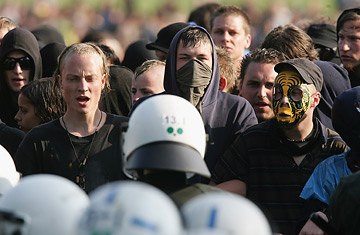
Demonstrators taunt German riot police during clashes between police and anti-G-8 activists June 7, 2007 at Bollhagen, Germany.
It's hard to get a fix on just what the 80,000 protesters who descended on the G-8 summit here in northern Germany this week actually want. Plodding through a field towards the 7.2 mile, multimillion-dollar fence designed to keep him and his unkempt peers out, Channing Jones, a 40-year-old American freelance programmer, said Wednesday his purpose was to get governments to "help the common people." Earlier in the day, the art group Dropping Knowledge had released a huge floating sculpture of a baby into the River Warnow, in a less-than-self-explanatory attempt to show that "the Western world is not really taking Africa seriously," according to one of the group's sponsors, Stefan Liske. Late Thursday afternoon, a man wearing a fluorescent pink wig and standing on stilts made up to look like enormous pink go-go boots declared he was blocking the main road to the summit "for freedom of movement for all people, and no nations and no borders!"
One priority these disparate, confused groups share, however, is bringing the annual G-8 meeting to a grinding halt. They managed to shut down all the road and rail access to the summit Wednesday, and interrupted it Thursday. Some skeptics at think-tanks and college campuses around the world have suggested that may not such a bad thing. The annual G-8 meeting is an anachronism that no longer pursues the economic agenda for which it was created, they argue; it doesn't include some of the world's most important economies (China and India are not in the club) and fails to achieve even the limited goals it sets for its members.
As a small group of protesters bounded through a wheat field on Wednesday afternoon pursued by a slightly larger group of policemen, it was hard not to wonder what the point of the whole exercise was.
Inside the fence, it turns out, some were asking the same question. In the whitewashed buildings of the elaborately restored Baltic resort of Heiligendamm, important things seemed to be happening. Russia's Vladimir Putin and President Bush strolled out past the massive beds of hydrangeas to say they had held good discussions on missile defense in Europe, with Putin provocatively proposing the use of Russian installations as a substitute for the ones the U.S. plans to place in Poland and the Czech Republic. And the G-8 leaders agreed on a putative program for addressing climate change.
But even in the highest-level delegations, there were skeptics. "They should just hold the whole thing over secure video-conference and make it every other year," said one White House aide Thursday morning. "There's a whole industry now surrounding the G-8, and two weeks from now, when it's all over here, they're going to start again for next year. In my opinion, they'd be better off sending the money to Africa."
The Germany summit cost $134 million, much of it spent on security. Measured by the organizers' outlay or by the media coverage the event receives, it appears as if the protests themselves have become the point.
True, the onset of the G-8 meeting prompted Bush last week to announce new initiatives on climate change, fighting AIDS in Africa, and sanctions over Darfur. And the summit symbolizes the participants' willingness to work together to solve the world's major problems, for whatever that's worth. But policy discussion at the summit is largely symbolic. Bush would certainly have rolled out the AIDS money anyway, and he and Putin will meet elsewhere to talk about missile defense.
Still, it's good for the local economy. Thomas Hess, the local man who drove me through fields and back roads in pursuit of police-protester interaction Wednesday, is not at all unhappy about the G-8. It has brought a palpable increase in funds to his home town: the roads are newly paved and the buildings replastered and painted. Even the protesters bring extra cash. The supermarket near one of the massive camps housing around 5,000 protesters extended its hours to accommodate the surge in demand for food and drinks.
But each year, the summit seems to get more expensive and harder to justify. The protesters find new ways to beat the security preparations; the media plays its part by focusing largely on the activities of the protesters and those ranged against them; and the resulting escalation raises the chances of someone getting hurt or killed, as happened several years ago in Genoa.
The group that might suffer most from doing away with the G-8 is the protesters, who would lose the premier platform for voicing their muddled dissent. And maybe that wouldn't be such a good thing. Beneath the confused thinking are some real issues that deserve a public forum. For example, the man on the go-go stilts, Berlin teacher Tony Mueller, 33, is campaigning for less restrictive policies for asylum seekers in Germany. And maybe someday the baby-floating artists at Dropping Knowledge will find a masterpiece more effective in convincing people to care about Africa.
Countries certainly waste money on worse things. If the costs keep rising and people regularly get hurt, the summit should be shut down. But if the purpose of holding the G-8 has become the carnival of complaint that accompanies it, so be it. And if Channing Jones wants to hump several miles across a field to try and convince governments to help the common people, why not?
